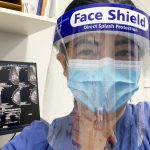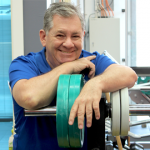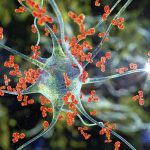Our researchers back COVID-safe measures like masks, social distancing and QR code technologies, track the increased consumption of alcohol during lockdown, and warn of the risks of delaying things like breast exams. Zoom provides the solution for a study aimed at keeping heart disease at bay for prostate cancer patients, while advances provide new hope for pre-term infants in low-resource countries, and and for those who suffer from migraines and the mysterious autoimmune encephalitis. Finally, with bushfire season around the corner, studies into the health impacts of air pollution and smoke particulates are timely indeed. Here’s just some of what’s happened this week at Alfred Research Alliance…
ALFRED HEALTH
Cancer doesn’t stop for COVID
 Between April and June this year, notifications of breast cancers decreased almost forty percent. Head of Alfred Health’s breast surgery unit, Dr Melanie Walker, said the COVID-19 restrictions should not be deterring people from seeing their GP for a breast exam. “It’s important to catch breast cancer as early as possible through routine screening, or an exam with your GP if you find symptoms,” she said. “The earlier it’s caught the better the outcome – most people are alive and well within ten years of being diagnosed.” Read more…
Between April and June this year, notifications of breast cancers decreased almost forty percent. Head of Alfred Health’s breast surgery unit, Dr Melanie Walker, said the COVID-19 restrictions should not be deterring people from seeing their GP for a breast exam. “It’s important to catch breast cancer as early as possible through routine screening, or an exam with your GP if you find symptoms,” she said. “The earlier it’s caught the better the outcome – most people are alive and well within ten years of being diagnosed.” Read more…
BAKER HEART AND DIABETES INSTITUTE
Trial helps men with prostate cancer lock-down exercise benefits
 Fitness training might seem like a big ask in combination with cancer treatment, add in a global pandemic and it becomes an even more Herculean effort. The Melbourne EX-HEART clinical trial led by researchers at Baker Institute and Australian Catholic University (ACU), has had to adapt, with Baker PhD student and researcher Ashley Bigaran switching exercise sessions to telehealth over Zoom, so her trial participants could still workout. Read more…
Fitness training might seem like a big ask in combination with cancer treatment, add in a global pandemic and it becomes an even more Herculean effort. The Melbourne EX-HEART clinical trial led by researchers at Baker Institute and Australian Catholic University (ACU), has had to adapt, with Baker PhD student and researcher Ashley Bigaran switching exercise sessions to telehealth over Zoom, so her trial participants could still workout. Read more…
BURNET INSTITUTE
Clinical trial shows sterioid a pre-term lifesaver
 A landmark clinical trial supported by Burnet Institute and the World Health Organization (WHO) has demonstrated the effectiveness dexamethasone, a glucocorticoid, in helping to save the lives of preterm newborn babies in low-resource countries. The WHO ACTION-I (Antenatal CorticosTeroids for Improving Outcomes in preterm Newborns) trial found that one preterm newborn baby’s life was saved for every 25 pregnant women treated with dexamethasone. Read more…
A landmark clinical trial supported by Burnet Institute and the World Health Organization (WHO) has demonstrated the effectiveness dexamethasone, a glucocorticoid, in helping to save the lives of preterm newborn babies in low-resource countries. The WHO ACTION-I (Antenatal CorticosTeroids for Improving Outcomes in preterm Newborns) trial found that one preterm newborn baby’s life was saved for every 25 pregnant women treated with dexamethasone. Read more…
Masks, social distancing as important as ever
 As Melbourne took a significant step forward out of lockdown this week with the easing of COVID-19 restrictions, Burnet Institute’s Prof Mike Toole AM spoke to ABC radio that, while he is confident the community will continue to observe two fundamental ongoing public health requirements – social distancing and the wearing of masks, the community must stay vigilant and guard against complacency to ensure numbers stay low. Read more…
As Melbourne took a significant step forward out of lockdown this week with the easing of COVID-19 restrictions, Burnet Institute’s Prof Mike Toole AM spoke to ABC radio that, while he is confident the community will continue to observe two fundamental ongoing public health requirements – social distancing and the wearing of masks, the community must stay vigilant and guard against complacency to ensure numbers stay low. Read more…
Support for QR code check-in tool in Victoria
 Victoria should adopt centralised QR technology to minimise the time spent by contact tracers collating information, Burnet Institute epidemiologist Professor Mike Toole AM told The Age. He said Victoria, as it reopened after a months-long lockdown, needed systems that support the quickest and most precise contact tracing. “It’s going to be really important from now on heading into summer because we want to have the tightest possible contact tracing,” he told the paper. Read more…
Victoria should adopt centralised QR technology to minimise the time spent by contact tracers collating information, Burnet Institute epidemiologist Professor Mike Toole AM told The Age. He said Victoria, as it reopened after a months-long lockdown, needed systems that support the quickest and most precise contact tracing. “It’s going to be really important from now on heading into summer because we want to have the tightest possible contact tracing,” he told the paper. Read more…
MONASH PUBLIC HEALTH & PREVENTIVE MEDICINE
Air pollution linked with cardiovascular disease

According to the WHO, nine out of ten people are at risk from breathing air that exceed its guideline limits of pollutants. Air pollution has been linked to the onset of cardiovascular diseases, so a project monitoring and understanding the health effects of pollution in one of China’s most polluted cities is providing useful insights into how air pollutants are associated with an increase in the levels of blood lipids and, therefore, in the risk of CVD. Read more…
COVID-19: Alcohol use and mental health problems in the pandemic
 Excessive alcohol use is an established public health problem in Australia, and did not originate from the coronavirus pandemic. But what has changed during the COVID-19 pandemic is how much alcohol we’re drinking at home, as a result of closed restaurants, clubs and hotels, and restrictions on numbers of people able to gather in parks. One in five adults reported they had increased their alcohol intake since February, with depression and anxiety key predictors for risk of excessive alcohol consumption. Read more…
Excessive alcohol use is an established public health problem in Australia, and did not originate from the coronavirus pandemic. But what has changed during the COVID-19 pandemic is how much alcohol we’re drinking at home, as a result of closed restaurants, clubs and hotels, and restrictions on numbers of people able to gather in parks. One in five adults reported they had increased their alcohol intake since February, with depression and anxiety key predictors for risk of excessive alcohol consumption. Read more…
Bushfire recovery and readiness
 This week marked the completion of the Royal Commission into National Natural Disaster, and also the beginning of bushfire season in Australia. Monash University experts have contributed to the investigation and knowledge base on a wide range of bushfire related topics, including smoke and air quality, the health impacts of harmful particulates in the air, and the link between the tiny particulate matter in smoke and respiratory illnesses and cardiac arrest. Read more…
This week marked the completion of the Royal Commission into National Natural Disaster, and also the beginning of bushfire season in Australia. Monash University experts have contributed to the investigation and knowledge base on a wide range of bushfire related topics, including smoke and air quality, the health impacts of harmful particulates in the air, and the link between the tiny particulate matter in smoke and respiratory illnesses and cardiac arrest. Read more…
MONASH CENTRAL CLINICAL SCHOOL
Autoimmune encephalitis: When your body attacks your brain…and people think you’re going mad
 It’s described as feeling like your brain is on fire. People with autoimmune encephalitis (AE) are often misdiagnosed as suffering from a psychiatric illness, delirium or dementia. The condition can mimic many other diseases, and hence there can be delays in diagnosis resulting in brain damage and a largely poor prognosis. The patients can be young or old, and the burden of misdiagnosed, late-diagnosed or wrongly diagnosed disease can be high. Read more…
It’s described as feeling like your brain is on fire. People with autoimmune encephalitis (AE) are often misdiagnosed as suffering from a psychiatric illness, delirium or dementia. The condition can mimic many other diseases, and hence there can be delays in diagnosis resulting in brain damage and a largely poor prognosis. The patients can be young or old, and the burden of misdiagnosed, late-diagnosed or wrongly diagnosed disease can be high. Read more…
New drug hope for migrane sufferers
 A recent study by Monash University has shown the effectiveness of a migraine drug called Erenumab (Aimovig) for chronic sufferers, with the incidence of ‘migraine attacks’ more than halved for over 50% of trial participants. While Erenumab has recently been withdrawn from the PBAC, Dr Elspeth Hutton from the Department of Neuroscience says two other treatments in the same class of CGRP monoclonal antibodies will hopefully soon be available at an affordable price for patients. Read more…
A recent study by Monash University has shown the effectiveness of a migraine drug called Erenumab (Aimovig) for chronic sufferers, with the incidence of ‘migraine attacks’ more than halved for over 50% of trial participants. While Erenumab has recently been withdrawn from the PBAC, Dr Elspeth Hutton from the Department of Neuroscience says two other treatments in the same class of CGRP monoclonal antibodies will hopefully soon be available at an affordable price for patients. Read more…
Early career research award for Dr Gemma Sharp
 Congratulations to Dr Gemma Sharp, who was this week awarded the Australian Psychological Society’s (APS) Early Career Researcher award for 2020. Dr Sharp is a Senior Research Fellow at the Monash Alfred Psychiatry Research Centre (MAPrc) where she leads the Body Image Research Group and holds a prestigious NHMRC Early Career Fellowship. She is known for her pioneering research in body image, particularly genital self-image. Read more »
Congratulations to Dr Gemma Sharp, who was this week awarded the Australian Psychological Society’s (APS) Early Career Researcher award for 2020. Dr Sharp is a Senior Research Fellow at the Monash Alfred Psychiatry Research Centre (MAPrc) where she leads the Body Image Research Group and holds a prestigious NHMRC Early Career Fellowship. She is known for her pioneering research in body image, particularly genital self-image. Read more »
Heart Foundation supports Monash research
 The Heart Foundation has announced funding for 13 projects at Monash to investigate the causes, treatment and prevention of heart disease, stroke and related disorders. This includes a Future Leader Fellowship for cardiovascular researcher to build their research capacity and become a leader of a research group, a Postdoctoral Fellowship to support an early-career cardiovascular researcher, nine Vanguard grants to test the feasibility of innovative ideas, a scholarship for a health professional to undertake a PhD and a Aboriginal and Torres Strait Islander award. Read more…
The Heart Foundation has announced funding for 13 projects at Monash to investigate the causes, treatment and prevention of heart disease, stroke and related disorders. This includes a Future Leader Fellowship for cardiovascular researcher to build their research capacity and become a leader of a research group, a Postdoctoral Fellowship to support an early-career cardiovascular researcher, nine Vanguard grants to test the feasibility of innovative ideas, a scholarship for a health professional to undertake a PhD and a Aboriginal and Torres Strait Islander award. Read more…
